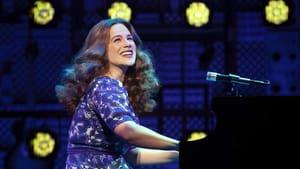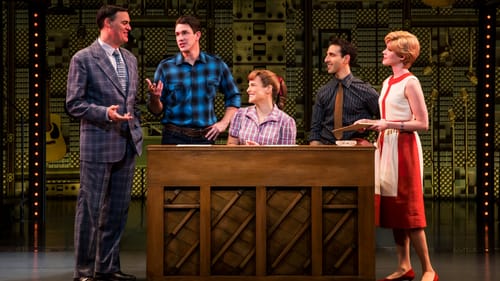Stay in the Loop
BSR publishes on a weekly schedule, with an email newsletter every Wednesday and Thursday morning. There’s no paywall, and subscribing is always free.
Natural woman
Broadway Philadelphia presents ‘Beautiful: The Carole King Musical’

A Brooklyn girl’s journey from shy teenage songwriter to solo superstar fuels Beautiful: The Carole King Musical, the predictable but enjoyable jukebox musical whose national tour is currently up at the Academy of Music. Carole King’s songs form the soundtrack of many lives, and they are used well here to tell her own story.
In that respect, Beautiful capitalizes on a formula set by predecessors like Jersey Boys and The Boy from Oz, though fortunately it eschews the stand-and-deliver narrative devices of those shows. Douglas McGrath’s snappy, frequently funny libretto instead follows a chronological journey as Carol Joan Klein (Sarah Bockel) moves from her schoolgirl days on Bedford Avenue to her Carnegie Hall debut. Along the way she meets and marries her songwriting partner, Gerry Goffin (Matt Faucher); changes her name; becomes a mother; and fully comes into her own.
A life in song
This musical memoir works in a way that some others in the genre don’t, largely because King and Goffin’s songs lend themselves nicely to establishing their biography. Those familiar with King’s breakthrough solo album, Tapestry, won’t find this surprising, as the 1970 record is one of a handful that ushered in the singer-songwriter movement. But even the tunes they composed as for-hire songwriters, made famous by other artists, act nicely as character statements.
“Will You Still Love Me Tomorrow,” which King wrote for the Shirelles, captures her fears that Gerry will one day lose interest in their marriage, a hasty arrangement undertaken when Carole became pregnant at seventeen. “Up on the Roof,” a hit for the Drifters, speaks to Gerry’s lifelong anxiety and struggle with mental illness. McGrath, director Marc Bruni, and choreographer Josh Prince smartly juxtapose diegetic performances of the songs within the musical’s narrative alongside pastiche performances by the groups that introduced them, all of whom nicely approximate period style.
Broadway nuts and bolts

Beautiful spends most of its long first act depicting the nuts and bolts of life inside 1650 Broadway, where King’s early career took off. (Derek McLane’s conveyor-belt set, brightly lit by Peter Kaczorowski, plays up the factory feeling). We also meet Barry Mann (endearing, nebbishy Jacob Heimer) and Cynthia Weil (strong-voiced Alison Whitehurst), the songwriting team with whom Carole and Gerry maintained a friendly rivalry. (Their hits include “On Broadway,” “Walking in the Rain,” and “You’ve Lost That Lovin’ Feeling”). The show offers a compelling portrait of how the music-industry sausage gets made.
The good old days?
What the show regrettably elides is a sense of the times underpinning the events presented. We hear rumbles of a “new sound” and receive nods to the changing social order, but these mostly remain asides. Many of the artists for whom King and Goffin wrote in their early days were black women, but the realities of race and gender in the 1950s and ‘60s receive little stage time. And when Gerry leaves Carole for the African-American singer Janelle Woods — a composite character likely based on the R&B singer Jeanie Reavis, with whom Goffin fathered a child — there’s little acknowledgement of the difficulties faced by interracial couples in an era when mixed marriages were still illegal in many states.
The sense that Beautiful wishes to amplify nostalgia while ignoring the social climate in which its songs were created carries through most of the second act, as Carole takes steps toward her solo career after divorcing Gerry. Scenes involving her strong-willed mother Genie (Suzanne Grodner, a ringer for Gertrude Berg) and supportive boss Don Kirshner (sympathetic James Clow) fall back on feel-good tropes. When Carole begins performing cornerstone hits like “It’s Too Late” and “You’ve Got a Friend,” the audience unleashes reverent applause at the sound of the opening chords.
Carrying Carole
The narrative settles nicely in its final scenes, as Carole realizes her ambition and her independence. Bockel, a prodigious vocal imitator, lets some of her own powerful voice slip into “(You Make Me Feel Like) A Natural Woman” and the title tune, elevating her performance beyond mimicry. She and Faucher share an affecting final scene, as Carole and Gerry take stock of what they made and what they lost.
Beautiful begins and ends with King alone on stage, as it should. Whatever the musical lacks, its creators never lose sight of the plain fact that they’re telling her story — and she deserves to be the center of attention.
What, When, Where
Beautiful: The Carole King Musical. Book by Douglas McGrath; music and lyrics by Carole King, Gerry Goffin, Barry Mann, and Cynthia Weil; Marc Bruni directed. Broadway Philadelphia. Through January 20, 2019, at the Academy of Music, 240 S. Broad Street, Philadelphia. (215) 893-1999 or kimmelcenter.org.
Sign up for our newsletter
All of the week's new articles, all in one place. Sign up for the free weekly BSR newsletters, and don't miss a conversation.

 Cameron Kelsall
Cameron Kelsall